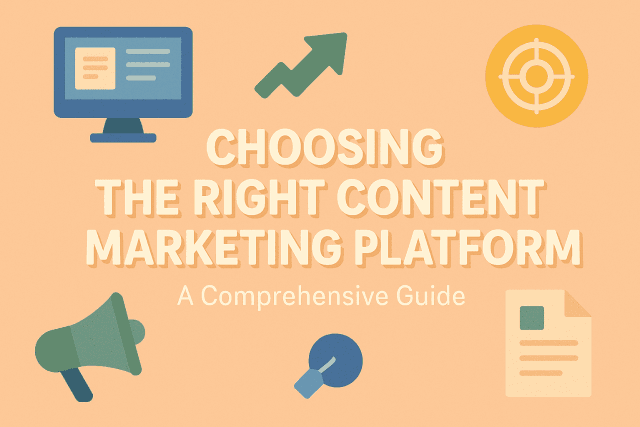In today’s digital age, content marketing has emerged as a powerful tool for brands to engage their audience, drive traffic, and increase conversion rates. However, success in this realm largely depends on the choice of the right content marketing platform. With a multitude of options available, selecting the ideal platform can seem daunting. This guide will break down the essential factors to consider when choosing a content marketing platform, ensuring you make an informed decision.
Understanding Content Marketing Platforms
Content marketing platforms are tools that help businesses create, manage, distribute, and analyze their content effectively. These platforms can vary significantly in features and focus areas, including blogs, social media, email marketing, and more.
Key Factors to Consider
Business Goals and Objectives
- Before exploring platforms, define your content marketing goals. Are you focused on brand awareness, lead generation, or customer engagement? Identifying your objectives will help you choose a platform with features that align with your vision.
User Experience and Interface
- A user-friendly interface is crucial for efficient content creation and management. Evaluate platforms by their ease of use and whether they require extensive technical skills. Trial versions can provide insights into how intuitive a platform is.
Content Formats Supported
- Different platforms support various content types—blogs, videos, infographics, podcasts, etc. Assess what types of content resonate with your audience and ensure the platform you choose supports these formats.
SEO Capabilities
- Search engine optimization is vital for content visibility. Look for platforms that offer strong SEO features, such as keyword optimization tools, Meta tags customization, and integration with analytics platforms for tracking performance.
Integration with Other Tools
- Your content marketing efforts should be cohesive. Choose a platform that integrates smoothly with your Customer Relationship Management (CRM) system, email marketing tools, and social media channels. This enables a unified approach to marketing campaigns.
Analytics and Reporting
- Understanding your content’s performance is key to iterating and improving your strategy. Look for platforms that provide comprehensive analytics and reporting features, allowing you to track metrics like engagement, traffic, conversion rates, and more.
Scalability and Flexibility
- As your business grows, your content marketing needs may evolve. Select a platform that can scale with your business, offering additional features or capabilities as your content strategy expands.
Budget
- Pricing models can vary widely between platforms, from free versions to expensive enterprise solutions. Consider your budget, but remember that a higher price often reflects more robust features. Evaluate what investment aligns with your strategy.
Community and Support
- A strong user community can provide invaluable resources and insights. Consider platforms that offer robust customer support, community forums, and tutorials to help you maximize your use of the system.
- Customization and Personalization
- Personalization enhances engagement. Choose a platform that allows for customization of content based on audience segments, helping you deliver the right message to the right people at the right time.
Popular Content Marketing Platforms
To provide some context, here are a few popular platforms that cater to different needs:
- HubSpot: Ideal for inbound marketing and offers a comprehensive suite of tools that include automation, analytics, and CRM integration.
- WordPress: Perfect for bloggers and businesses seeking a customizable site with a plethora of plugins for SEO and content management.
- CoSchedule: Best for teams looking to manage their editorial calendar with tools for social media marketing and collaboration.
- Buffer: Excellent for social media content distribution, allowing for scheduling and performance tracking across different social platforms.
- Mailchimp: Great for email marketing campaigns with easy-to-use templates and strong analytics features.
Conclusion
Choosing the right content marketing platform requires careful consideration of your business goals, audience needs, and available features. By evaluating each prospective platform against the key factors mentioned in this guide, you can make an informed decision that sets your content marketing strategy up for success. Remember, the right platform not only streamlines your efforts but also amplifies your brand’s message, engages your audience more effectively, and drives desired results. Invest time in your selection process, and watch your content marketing thrive.









